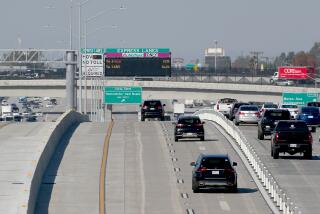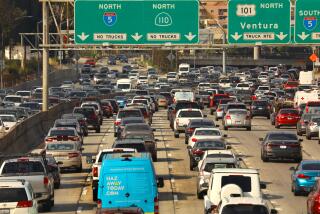Bill to raise auto dealer documentation fees gains momentum
Documentation fees charged by auto dealers would rise by at least $25 under a state bill that is being supported by consumer groups and car retailers.
The legislation is gaining steam because it also would require dealers to warn buyers whether a vehicle for sale has been previously totaled or salvaged.
The legislation, AB 1215 by Bob Blumenfield (D-Woodland Hills), has already been passed by the state Assembly and will be considered by the state Senate when it returns from its summer recess Monday.
Under the bill, auto retailers will be able to raise the documentation fees charged for processing auto purchases and lease agreements to $80 from $55 for new- and used-car purchases and from $45 for car leases.
Dealers would also be required to run the vehicle identification number of any used auto for sale on their lots through the National Motor Vehicle Title Information System to check whether the auto has a so-called branded title. Any vehicles showing up as having been totaled or bought back through a lemon law or a victim of some other catastrophe would get a red window sticker warning potential buyers of the auto’s history.
Insurance carriers, repair shops, towing companies and salvage yards must report totaled vehicles to the database, which is overseen by the U.S. Justice Department.
The legislation is supported by law enforcement agencies, consumer groups and the California New Car Dealers Assn.
“This is a huge breakthrough. The dealers have been really good to work with on this,” said Rosemary Shahan, president of Consumers for Auto Reliability and Safety.
Car dealers support the move to electronic registration of vehicles and the reporting provisions of the bill, said Peter Welch, president of the California New Car Dealers Assn.
“We also like the idea that there is a government-overseen database that has third-party integrity. And remember that our members sold 800,000 used cars last year. We are consumers of cars too,” Welch said.
He noted that the bill represents the first time his business group was at the state Capitol lobbying with consumer groups and law enforcement for passage of legislation.
Law enforcement agencies are supporting the legislation because it would also speed up the assignment of license plates to vehicles, making it easier to track cars.
The change to a faster electronic vehicle registration system is supported by local governments and toll authorities that lose millions of dollars annually from traffic violators and toll scofflaws whose rear license plates can’t be identified.
The Bay Area Toll Authority, a proponent of the increased fees, has estimated that about 700,000 vehicles without license plates cross San Francisco Bay Area toll bridges annually without paying a toll, costing the agency $2.8 million.
Blumenfield said that if passed, the electronic registration provision would save the Department of Motor Vehicles about $10 million, which could be used to reduce lines at the agency.
Opposition has come from companies such as Carfax Inc., which sells a $34.99 report about a vehicle’s history captured from such sources as repair records, insurance claims and police reports. The auto information company is seeking amendments to the bill so that dealers could either obtain a report from the federal database or a “commercially available vehicle history report” for the vehicle identification number of the vehicle.
“We think that buyers and sellers should have a choice of vehicle history, and prescribing one limits consumer access,” said Larry Gamache, a Carfax spokesman.
He said that many buyers are able to get the Carfax report free from the seller of a vehicle and that one result of the proposed law is that they would be less likely to pursue the company’s report, which he said is more extensive than what comes from the national database.
Consumer groups objected to similar legislation raising documentation fees that was scuttled last year. That proposal did not include the added consumer warnings about totaled and salvaged vehicles.







